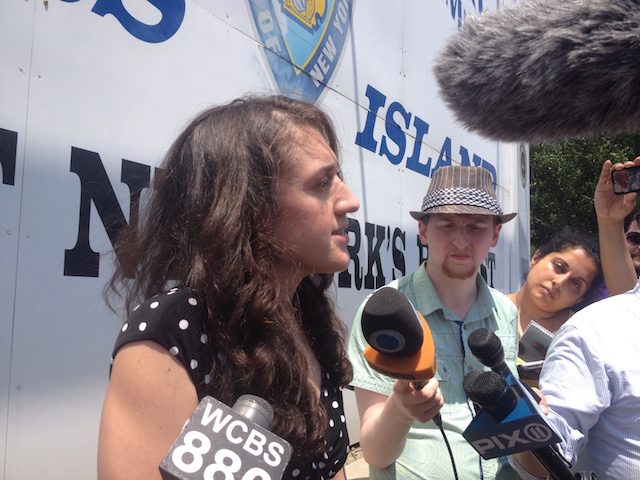Editor’s Note: José Negroni is the former communications director for the Cuomo-aligned Build Up NYC, a coalition of unions. He is a graduate of Sarah Lawrence College and Columbia University. The opinions expressed in this book review are his.
Reading about the dehumanizing conditions that female inmates endure at the Rikers Island Prison Complex in The Emancipation of Cecily McMillan (Nation Books, 2016) could be clinically used as an emetic. Alas, a fellow 17-year-old inmate of Ms. McMillan’s regurgitates what appear to be chunks of her liver, is denied proper medical care, and shortly thereafter dies. This heartbreakingly sad and quite frightening memoir also keeps the Occupy saga going on the eve of its five-year September 17th anniversary.

Throughout the book, Ms. McMillan, 27, tells the story, not so much of an activist who takes a stand against the financial oligarchy that has overtaken this country, but of a young woman who is outfoxed by the American way, railing on about the abusive parenting she experienced growing up in a trailer park in the South, the parties she attended in high school with all the busts, the backbiting from wealthier students at a liberal arts college in Wisconsin, Scott Walker’s shtick against organized labor, etc. She finally discovers the hidden leftish family member who is a co-founder of the 1960s antiwar Students for a Democratic Society (SDS) and when presented with this hidden history, becomes a socialist and joins today’s consummate blue city millennial set in Brooklyn where before you know it she’s an unapologetic occupier in Lower Manhattan during the American Autumn of 2011. Albeit one who in trying to get her comrades at Zuccotti Park to all move in the same direction toward the Stock Exchange makes it feel as if she’s herding cats—or protesters. Finally, instead of dealing with things in a courageously relaxed manner, one could argue that the police were heavy-handed in their interactions with Occupy Wall Street (OWS), which led to thousands of arrests nationwide. And so, for Ms. McMillan this all results at the drop of a hat in a caught-on-camera 2012 altercation with a police officer, followed by a 2014 conviction of second-degree assault, and leading to 59 days served in jail where she catches a fluttering glimpse of the togetherness she yearned for as an activist, only this time among inmates looking to better their degrading conditions against the framework of the prison industrial complex where guards regularly turn a blind eye to physical impairments.
But that’s long past now, Ms. McMillan who’s since then been featured in Cosmopolitan and Vanity Fair, is now described by Nation Books in their book jacket as a “sophisticated political thinker, a charismatic public figure,… and voice of her generation.” I credit her with being a woman who messed with real power, like police officers who politically are told to enable fraudulent bankers, and thus stepped into the world of real consequences. In an underdeveloped region, a young woman of Ms. McMillan’s pedigree may have had to prostitute herself to a sexpat investment banker, in America it’s a fairly different scenario, and one that oftentimes involves law enforcement.
And OWS did severely involve the police because the unsung heroes from Zuccotti Park who challenged the American juggernaut of corporatist power were the likes of Alexis Goldstein, Ryan Hoffman, Marina Keegan, Lex Rendon, Victoria Sobel, and Stephen Zarlenga, among others. Conversely, Ms. McMillan is a post-Occupy figure who wears her liberal heart on her sleeve. Throughout the memoir, she shares her patchwork quilt of ideas ranging from more money for public services to unions militating on behalf of OWS as its leadership.
Looking back on it, the other activists who did take a stand against the paradigm of bank corruption five years ago were the likes of Ms. Sobel, a treasurer at OWS who went on to lead the anti-college privatization Free Cooper Union movement, where she addressed the college debt problem and ultimately helped sue Cooper’s board that squandered the endowment.
Then there was Ms. Goldstein whose offshoot, Occupy the SEC, insisted that the government and its departments and agencies be held to account. She understood what we the people controlled. While this was going on, the riffraff at Zuccotti were waging petty arguments over the ridiculous human megaphone, instead of reducing the movement to one cause: regulation, and forgetting all other issues. Ms. McMillan’s description of a failed attempt to lead a faction to fortress themselves inside the Stock Exchange brings to mind how OWS really was like standing in front of a mafia bar because they shook down your bodega.
Further to that, Ms. McMillan lodges complaints about not being able to put together a list of demands for the occupiers. Her efforts seem to ignore that, early in the movement, Ms. Rendon and Mr. Hoffman had already co-authored the extremely serious Declaration of the Occupation of New York City.
Another activist who held her head high was Marina Keegan, (The Opposite of Loneliness, Scribner 2014), who died in 2012 from a regular car accident. When I first met her, she ran Occupy Yale and Occupy Morgan Stanley. She was also reporting on people in Yale’s secret societies, moving into the upper tier of sectors of influence in American society. She was due to start at The New Yorker prior to her death at 22.
Another real joy out of Zuccoti was how intellectually honest some occupiers were about understanding banking, a scam within a scam, like three-card monte where you’re actually being pick-pocketed. I remember Dr. Zarlenga, a brilliant scholar, always considering things more deeply and explaining to me the 2011 NEED Act introduced by representatives John Conyers and Dennis Kucinich, the crux of it being a bill laying out monetary reform where the Fed can be incorporated into the U.S. Treasury so that when the government needs to spend money it can create its own debt-free money in a non-inflationary manner, instead of obtaining funds through taxation or borrowing. Concerning banks and capital markets, banks would do what people think they do now: receive deposits and make loans out of documented, legally binding reserves. If the banks made a bad loan, they wouldn’t be bailed out, they would become unprofitable. And many of the more destructive financial instruments of recent years (naked shorts and derivatives that function as insurance products but escape the capital requirements of insurance while sold as financial products) would be eliminated. Banks would risk the money they have on deposit, and that’s it. Executives would be criminally and civilly liable for the accuracy of their balance sheets.
In reality, The Emancipation of Cecily McMillan does bring forward her ideas on how to fundamentally right the world. The final chapter shows how messed up the criminal justice system can be and how inmates are harassed, treated as if they don’t hold intrinsic value, and, accordingly, denied their basic human needs. To the author’s credit, she helps to organize her cellmates against the predicament of having to deal with correctional officers who are getting undealt-with-crap out on them, in a way that transcends people’s self-definitions, group affiliations, and resentment toward others. While it was futile at Zuccotti Park, Ms. McMillan is finally able to wake up people that are hard to be woken up.
And one thing is clear, though: upon her release, Ms. McMillan’s speech in honor of her fellow inmates inevitably marks her as a person qualified to speak about the importance of prisoners’ rights. There is no hustle by any side in that equation, she is now a serious and committed spokesperson for a disadvantaged constituency that is faced with a monolith in terms of rehabilitation within the shoddiest of prison systems, to be honest.
Whatever Ms. McMillan does next, her sequel may be a good excuse to ask: where were the handcuffs for the bailout recipients who did not comply with the law in the period in which the securities that caused the 2008 crisis were issued?






